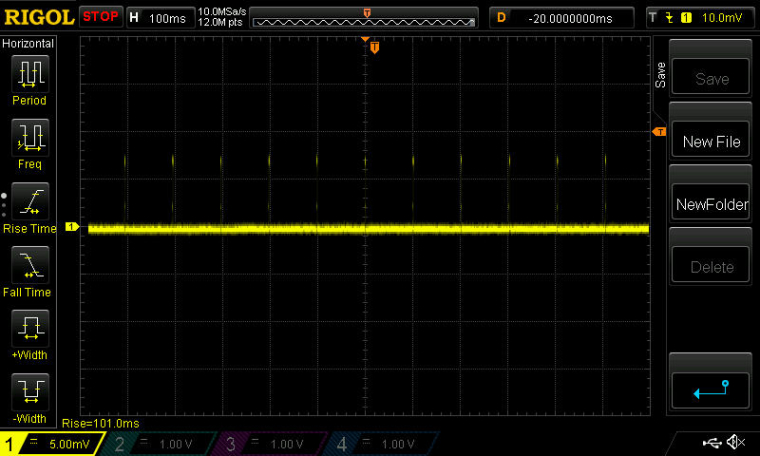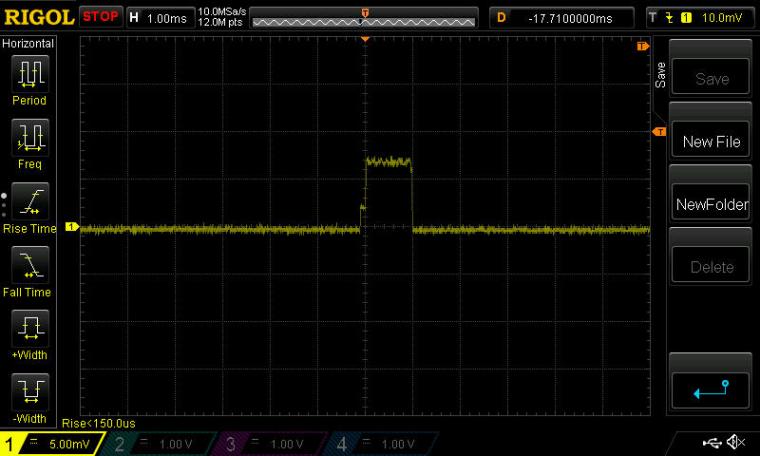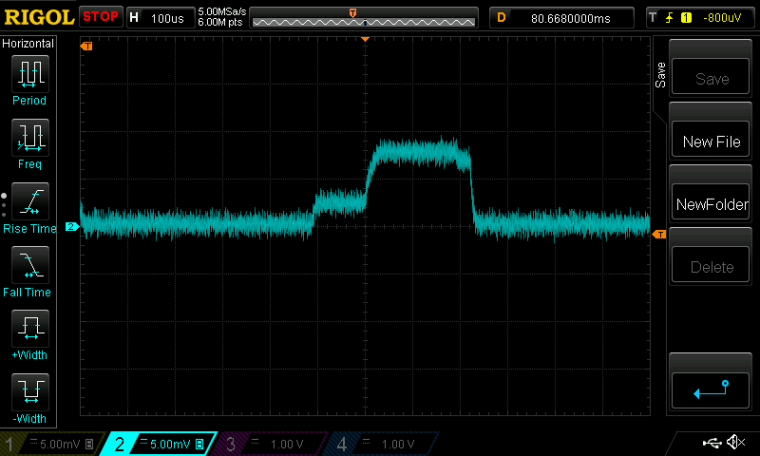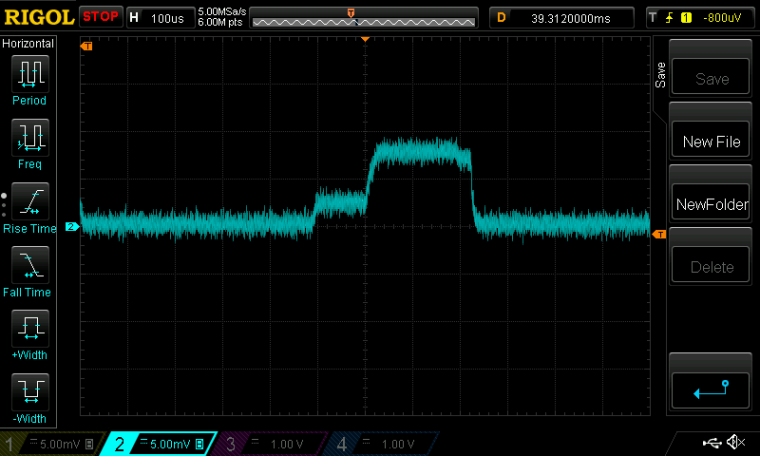nRF5 action!
-
@Jokgi said in nRF5 Bluetooth action!:
@NeverDie I am not sure about all the boards for sell on that site. but I would have to say that any J-link programmer that is packaged as such for $12-$40 dollars is probably counterfeit. Updating these items with newer J-link firmware would more then likely disable them. (On purpose)
Yes they are of course counterfeit, and using old firmware. You have a message when you use them with Segger software asking you to upgrade to newer firmware and if you accept your programmer is disabled (web is full of solutions to reflash a firmware).
But if you don't upgrade the firmware it works fine as a SWD programmer, at least for basic use (programming). I have not tried any debugging. -
Are we limited to using RTC0? I've tried switching to RTC1 and RTC2, and I get the sense there are conflicts with both of them and the MySensors code if they're used.
-
Are we limited to using RTC0? I've tried switching to RTC1 and RTC2, and I get the sense there are conflicts with both of them and the MySensors code if they're used.
@NeverDie said in nRF5 Bluetooth action!:
Are we limited to using RTC0? I've tried switching to RTC1 and RTC2, and I get the sense there are conflicts with both of them and the MySensors code if they're used.
RTC1 is blocked by arduino (nRF5/delay.c) and RTC0 (nRF51) and RTC2 (nRF52) is used in MySensors (hal/architecture/MyHwNRF5.cpp)
-
Success. I now have a "listen mode" for the nRF52832 radio that's completely controlled by the PPI while the MCU sleeps. Presently, it wakes up the radio every 100ms and listens for 1ms. This means no wasted power from oversight by the MCU. Using just the PPI, I can control to within about 30us over how long to make the cycle period and/or the listening duration.


The scope shots show the current drawn. Scale: 1mv=1ma. As you can see, the DCDC regulator is engaged.
Next step will be to have packet receipt wake up the MCU via an ISR, so that the packet can be processed. After that, I'll see how narrow I can make the receive window and still receive packets reliably. I think under 100us will be possible. Maybe even less than 60us if the bitrate is 2mbps. :)
-
Success. I now have a "listen mode" for the nRF52832 radio that's completely controlled by the PPI while the MCU sleeps. Presently, it wakes up the radio every 100ms and listens for 1ms. This means no wasted power from oversight by the MCU. Using just the PPI, I can control to within about 30us over how long to make the cycle period and/or the listening duration.


The scope shots show the current drawn. Scale: 1mv=1ma. As you can see, the DCDC regulator is engaged.
Next step will be to have packet receipt wake up the MCU via an ISR, so that the packet can be processed. After that, I'll see how narrow I can make the receive window and still receive packets reliably. I think under 100us will be possible. Maybe even less than 60us if the bitrate is 2mbps. :)
@NeverDie Great Job!!!! Suggestion... If you are going to use the BTLE Softdevice you will have a smaller receive window if you use the external 32khz crystal option rather then the internal 32khz RC one. (+/- 20ppm with the crystal vs +/- 250 or 500ppm with the RC.
-
At the extreme, one of the questions that will need answering is: what's the minimum number of bytes in a transmitted frame that you really do need before the receiver starts receiving garbage packets? For instance, a 10 byte frame, which should be more than adequate, would take 40us of airtime to either transmit or receive at 2mbps bitrate. One could get to a lower number by maybe sending a null packet as a wake-up packet, in which case maybe you also don't need CRC. So, that leaves you with some preamble, a network ID, and maybe a destination ID--or about 5 bytes. So, that would be around 20us of airtime. One could shrink that further by reducing the number of network ID bytes, but too much of that and possibly one starts to receive garbage packets.
The RFM69 doesn't try to decode packets whose RSSI is below a specific programmable threshhold. I don't believe the nRF52 radio uses RSSI as a filter in that way though. It seems that the nRF52832 radio tries to decode whatever it's receiving, regardless of the RSSI. Or, at least, that's how I remember it. Anyone else played around with it?
-
I adapted your RTC0 code for handling IRQ's, and it looks like this:
NRF_RADIO->INTENSET = B100; //interrupt MCU if a payload is received. // Enable interrupt NVIC_SetPriority(RADIO_IRQn, 15); NVIC_ClearPendingIRQ(RADIO_IRQn); NVIC_EnableIRQ(RADIO_IRQn); #if __CORTEX_M == 0x04 #define NRF5_RESET_EVENT(event) \ event = 0; \ (void)event #else #define NRF5_RESET_EVENT(event) event = 0 #endif // This must be in one line extern "C" { void RADIO_IRQHandler(void) {packetCounter++; NRF5_RESET_EVENT(NRF_RADIO->EVENTS_PAYLOAD); NRF_RADIO->EVENTS_PAYLOAD=0; }}Question: Is
NRF5_RESET_EVENT(NRF_RADIO->EVENTS_PAYLOAD);doing anything more than
NRF_RADIO->EVENTS_PAYLOAD=0;is?
-
The good news is that I can now literally "see" that the listen-mode is receiving packets, because I've programmed the PPI to toggle an LED every time a packet is received (and it only toggles the LED if and only if I know that I'm sending the node packets from a different node). The bad news is that--so far, anyway--it doesn't appear to trigger an IRQ event that wakes up the MCU and runs the ISR.
-
At the extreme, one of the questions that will need answering is: what's the minimum number of bytes in a transmitted frame that you really do need before the receiver starts receiving garbage packets? For instance, a 10 byte frame, which should be more than adequate, would take 40us of airtime to either transmit or receive at 2mbps bitrate. One could get to a lower number by maybe sending a null packet as a wake-up packet, in which case maybe you also don't need CRC. So, that leaves you with some preamble, a network ID, and maybe a destination ID--or about 5 bytes. So, that would be around 20us of airtime. One could shrink that further by reducing the number of network ID bytes, but too much of that and possibly one starts to receive garbage packets.
The RFM69 doesn't try to decode packets whose RSSI is below a specific programmable threshhold. I don't believe the nRF52 radio uses RSSI as a filter in that way though. It seems that the nRF52832 radio tries to decode whatever it's receiving, regardless of the RSSI. Or, at least, that's how I remember it. Anyone else played around with it?
-
It turns out that using just the standard radiohead packet/frame structure, I'm able to 100% reliably receive a two byte string (in this case, the letter "H" followed by a zero as the termination character) using the above PPI solution with a receive window of about 200ms. That includes preamble, CRC, and a long network ID number.
I'm pleased with that result. It's vastly better than without the PPI solution.
-
OK, I'm going to start with this, which works:
//A simplified re-mix of code mostly written by d00616 #include <nrf.h> #include <MySensors.h> int interrupt = 0; uint32_t theCounter; int8_t myHwSleep(unsigned long ms) { hwSleepPrepare(ms); //while (nrf5_rtc_event_triggered == false) { hwSleep(); //} hwSleepEnd(ms); return MY_WAKE_UP_BY_TIMER; } void setup() { // put your setup code here, to run once: Serial.begin(250000); Serial.println("Start"); // Configure RTC NRF_RTC0->TASKS_STOP = 1; NRF_RTC0->PRESCALER = 32; NRF_RTC0->CC[0] = NRF_RTC0->COUNTER + (655); //comparison for when to turn off the Rx. NRF_RTC0->EVTENSET = RTC_EVTENSET_COMPARE0_Msk; NRF_RTC0->INTENSET = RTC_INTENSET_COMPARE0_Msk; NRF_RTC0->TASKS_START = 1; NRF_RTC0->EVENTS_COMPARE[0] = 0; // Enable interrupt NVIC_SetPriority(RTC0_IRQn, 15); NVIC_ClearPendingIRQ(RTC0_IRQn); NVIC_EnableIRQ(RTC0_IRQn); Serial.println(); Serial.println(); Serial.println("Starting..."); } void loop() { Serial.print(millis()); Serial.print(" "); Serial.print(theCounter); Serial.print(" "); Serial.println(interrupt); myHwSleep(5000000); } /** * Reset events and read back on nRF52 * http://infocenter.nordicsemi.com/pdf/nRF52_Series_Migration_v1.0.pdf */ #if __CORTEX_M == 0x04 #define NRF5_RESET_EVENT(event) \ event = 0; \ (void)event #else #define NRF5_RESET_EVENT(event) event = 0 #endif // This must be in one line extern "C" { void RTC0_IRQHandler(void) { theCounter=NRF_RTC0->COUNTER; NRF5_RESET_EVENT(NRF_RTC0->EVENTS_COMPARE[0]); interrupt++; NRF_RTC0->TASKS_CLEAR = 1; }}and see if I can generate equivalent code which triggers on a pin change instead of an RTC event. If I can get that to work, then I'll take another stab at getting it to work based on the radio receiving a packet.
-
I was only partially done with the code, but I decided to run it anyway. Oddly enough, even though there is no reference to " RTC0_IRQHandler(void)" as being the event handler, it gets fired off anyway whenever I press the button (pin P0.16):
#include <nrf.h> #include <MySensors.h> int interrupt = 0; uint32_t theCounter; int8_t myHwSleep(unsigned long ms) { hwSleepPrepare(ms); hwSleep(); hwSleepEnd(ms); return MY_WAKE_UP_BY_TIMER; } void setup() { // put your setup code here, to run once: Serial.begin(250000); Serial.println("Start"); //Configure GPIOTE NRF_GPIOTE->CONFIG[0]=0x31001; // Toggle Event; Pin P0.16; Event Mode //So, any pin change on P0.16 will trigger an event. //On the Nordic nRF52 DK, Pin 0.16 is a button. NRF_GPIOTE->CONFIG[1]=0x131203; //Initial setting: HIGH; Toggle Task; Pin P0.18; Task Mode //On the Nordic nRF52 DK, Pin 0.18 is an LED. //Note: initial setting of HIGH means that the LED will be initially OFF. NRF_GPIOTE->INTENSET=1; //Enable an event on Pin P0.16 to trigger an interrupt. NRF_PPI->CH[0].EEP = (uint32_t)&NRF_GPIOTE->EVENTS_IN[0]; //P0.16 pin change occured. NRF_PPI->CH[0].TEP = (uint32_t)&NRF_GPIOTE->TASKS_OUT[1]; //Toggle LED on pin P0.18. NRF_PPI->CHENSET=B1; //enable Channel 0. // Enable interrupt NVIC_SetPriority(GPIOTE_IRQn, 15); NVIC_ClearPendingIRQ(GPIOTE_IRQn); NVIC_EnableIRQ(GPIOTE_IRQn); Serial.println(); Serial.println(); Serial.println("Starting..."); } void loop() { Serial.print(millis()); Serial.print(" "); Serial.print(theCounter); Serial.print(" "); Serial.println(interrupt); myHwSleep(5000000); } /** * Reset events and read back on nRF52 * http://infocenter.nordicsemi.com/pdf/nRF52_Series_Migration_v1.0.pdf */ #if __CORTEX_M == 0x04 #define NRF5_RESET_EVENT(event) \ event = 0; \ (void)event #else #define NRF5_RESET_EVENT(event) event = 0 #endif // This must be in one line extern "C" { void RTC0_IRQHandler(void) { theCounter=NRF_RTC0->COUNTER; NRF5_RESET_EVENT(NRF_RTC0->EVENTS_COMPARE[0]); interrupt++; NRF_RTC0->TASKS_CLEAR = 1; }}So, it looks as though, at present, there can be only a single ISR for an entire sketch?
-
Interesting result. I eliminated most of the sample code, and it actually manages to work even without an ISR! Instead of running an ISR, it appears to simply wake up from exactly where it last fell asleep. Then it continues running until it's put to sleep again:
#include <nrf.h> #include <MySensors.h> uint32_t buttonPressCounter=0; int8_t myHwSleep(unsigned long ms) { hwSleepPrepare(ms); hwSleep(); hwSleepEnd(ms); return MY_WAKE_UP_BY_TIMER; } void setup() { // put your setup code here, to run once: Serial.begin(250000); Serial.println("Start"); //Configure GPIOTE NRF_GPIOTE->CONFIG[0]=0x31001; // Toggle Event; Pin P0.16; Event Mode //So, any pin change on P0.16 will trigger an event. //On the Nordic nRF52 DK, Pin 0.16 is a button. NRF_GPIOTE->CONFIG[1]=0x131203; //Initial setting: HIGH; Toggle Task; Pin P0.18; Task Mode //On the Nordic nRF52 DK, Pin 0.18 is an LED. //Note: initial setting of HIGH means that the LED will be initially OFF. NRF_GPIOTE->INTENSET=1; //Enable an event on Pin P0.16 to trigger an interrupt. NRF_PPI->CH[0].EEP = (uint32_t)&NRF_GPIOTE->EVENTS_IN[0]; //P0.16 pin change occured. NRF_PPI->CH[0].TEP = (uint32_t)&NRF_GPIOTE->TASKS_OUT[1]; //Toggle LED on pin P0.18. NRF_PPI->CHENSET=B1; //enable Channel 0. // Enable interrupt NVIC_SetPriority(GPIOTE_IRQn, 15); NVIC_ClearPendingIRQ(GPIOTE_IRQn); NVIC_EnableIRQ(GPIOTE_IRQn); Serial.println(); Serial.println(); Serial.println("Starting..."); } void loop() { Serial.print("time="); Serial.print(millis()); Serial.print(", buttonPressCounter="); Serial.println(buttonPressCounter++); myHwSleep(5000000); } -
I adapted your RTC0 code for handling IRQ's, and it looks like this:
NRF_RADIO->INTENSET = B100; //interrupt MCU if a payload is received. // Enable interrupt NVIC_SetPriority(RADIO_IRQn, 15); NVIC_ClearPendingIRQ(RADIO_IRQn); NVIC_EnableIRQ(RADIO_IRQn); #if __CORTEX_M == 0x04 #define NRF5_RESET_EVENT(event) \ event = 0; \ (void)event #else #define NRF5_RESET_EVENT(event) event = 0 #endif // This must be in one line extern "C" { void RADIO_IRQHandler(void) {packetCounter++; NRF5_RESET_EVENT(NRF_RADIO->EVENTS_PAYLOAD); NRF_RADIO->EVENTS_PAYLOAD=0; }}Question: Is
NRF5_RESET_EVENT(NRF_RADIO->EVENTS_PAYLOAD);doing anything more than
NRF_RADIO->EVENTS_PAYLOAD=0;is?
@NeverDie said in nRF5 Bluetooth action!:
Question: Is
NRF5_RESET_EVENT(NRF_RADIO->EVENTS_PAYLOAD);doing anything more than
NRF_RADIO->EVENTS_PAYLOAD=0;is?
Yes. It reads back the register. http://infocenter.nordicsemi.com/topic/com.nordic.infocenter.nrf52/dita/nrf52/migration/functional.html?cp=2_4_0
-
Whenever I use:
#include <MySensors.h>on the nRF52832, there is around a 10 second delay between the end of "void startup()" and the beginning of "loop()". Why is that, and what is the MySensors library doing during that interval?
-
Whenever I use:
#include <MySensors.h>on the nRF52832, there is around a 10 second delay between the end of "void startup()" and the beginning of "loop()". Why is that, and what is the MySensors library doing during that interval?
-
@NeverDie said in nRF5 Bluetooth action!:
If your goal is to minimize the RX-on time, then you can trigger the RX start and stop by a timer for your minimal window where the frame must be start. Then use the bitcounter top stop the timer in case a packet is received. A shortcut to the end is disabling the RX mode. You can wakeup the CPU with the END event.P.S.: you can reduce the RX/TX time by enabling fast ramp up in MODECNF0 if you haven't to care about nRF51 compatibility.
@d00616 said in nRF5 Bluetooth action!:
P.S.: you can reduce the RX/TX time by enabling fast ramp up in MODECNF0 if you haven't to care about nRF51 compatibility.
Thanks for the tip. I tried it both ways. The first scope capture below is taken without MODECNF0 enabled on bit 0, and the second is with it enabled on bit 0.


I don't really see any difference. Do you?
Scale: 1mv=1ma. Scope captures of current drawn.Maybe @jokgi can comment? His bio says he's a Senior Field Application Engineer at Nordic Semiconductor.
Maybe he sees (or knows) something that's not apparent about the fast ramp enable bit? -
Whenever I use:
#include <MySensors.h>on the nRF52832, there is around a 10 second delay between the end of "void startup()" and the beginning of "loop()". Why is that, and what is the MySensors library doing during that interval?
@NeverDie said in nRF5 Bluetooth action!:
Whenever I use:
#include <MySensors.h>on the nRF52832, there is around a 10 second delay between the end of "void startup()" and the beginning of "loop()". Why is that, and what is the MySensors library doing during that interval?
As an alternative, you can define '#define MY_CORE_ONLY' and use ' transportInit(); transportSetAddress(MY_NODE_ID);' to initialize the radio. This dosn't work at the moment with the nRF5. I'm currently looking what the reason is. All radio registers are equal when it's initialized after MySensors normal and my setup(). It's not able to send or receive packages.
Maybe someone has an idea about the reason. Here is my code for nRF5 and other with nRF24.
// Undefine to work in gateway mode #define MY_CORE_ONLY #define MY_NODE_ID (0) // Enable debug #define MY_DEBUG #define MY_DEBUG_VERBOSE_RF24 #define MY_DEBUG_VERBOSE_NRF5_ESB // Enable and select radio type attached #ifndef ARDUINO_ARCH_NRF5 #define MY_RADIO_NRF24 #else #define MY_RADIO_NRF5_ESB #include <nrf.h> #endif //#define MY_RADIO_RFM69 //#define MY_RADIO_RFM95 //#define MY_OTA_LOG_SENDER_FEATURE //#define MY_OTA_LOG_RECEIVER_FEATURE #ifndef MY_CORE_ONLY #define MY_GATEWAY_SERIAL #endif #include <MySensors.h> void state() { #ifdef ARDUINO_ARCH_NRF5 Serial.println("----------------------------------"); Serial.print("NRF_RADIO->STATE "); Serial.println(NRF_RADIO->STATE, HEX); Serial.print("NRF_RADIO->EVENTS_READY "); Serial.println(NRF_RADIO->EVENTS_READY, HEX); Serial.print("NRF_RADIO->EVENTS_ADDRESS "); Serial.println(NRF_RADIO->EVENTS_ADDRESS, HEX); Serial.print("NRF_RADIO->EVENTS_PAYLOAD "); Serial.println(NRF_RADIO->EVENTS_PAYLOAD, HEX); Serial.print("NRF_RADIO->EVENTS_END "); Serial.println(NRF_RADIO->EVENTS_END, HEX); Serial.print("NRF_RADIO->EVENTS_DISABLED "); Serial.println(NRF_RADIO->EVENTS_DISABLED, HEX); Serial.print("NRF_RADIO->EVENTS_DEVMATCH "); Serial.println(NRF_RADIO->EVENTS_DEVMATCH, HEX); Serial.print("NRF_RADIO->EVENTS_DEVMISS "); Serial.println(NRF_RADIO->EVENTS_DEVMISS, HEX); Serial.print("NRF_RADIO->EVENTS_RSSIEND "); Serial.println(NRF_RADIO->EVENTS_RSSIEND, HEX); Serial.print("NRF_RADIO->EVENTS_BCMATCH "); Serial.println(NRF_RADIO->EVENTS_BCMATCH, HEX); Serial.print("NRF_RADIO->CRCSTATUS "); Serial.println(NRF_RADIO->CRCSTATUS, HEX); Serial.print("NRF_RADIO->RXMATCH "); Serial.println(NRF_RADIO->RXMATCH, HEX); Serial.print("NRF_RADIO->RXCRC "); Serial.println(NRF_RADIO->RXCRC, HEX); Serial.print("NRF_RADIO->DAI "); Serial.println(NRF_RADIO->DAI, HEX); Serial.print("NRF_RADIO->PACKETPTR "); Serial.println(NRF_RADIO->PACKETPTR, HEX); Serial.print("NRF_RADIO->FREQUENCY "); Serial.println(NRF_RADIO->FREQUENCY, HEX); Serial.print("NRF_RADIO->TXPOWER "); Serial.println(NRF_RADIO->TXPOWER, HEX); Serial.print("NRF_RADIO->MODE "); Serial.println(NRF_RADIO->MODE, HEX); Serial.print("NRF_RADIO->PCNF0 "); Serial.println(NRF_RADIO->PCNF0, HEX); Serial.print("NRF_RADIO->PCNF1 "); Serial.println(NRF_RADIO->PCNF1, HEX); Serial.print("NRF_RADIO->BASE0 "); Serial.println(NRF_RADIO->BASE0, HEX); Serial.print("NRF_RADIO->BASE1 "); Serial.println(NRF_RADIO->BASE1, HEX); Serial.print("NRF_RADIO->PREFIX0 "); Serial.println(NRF_RADIO->PREFIX0, HEX); Serial.print("NRF_RADIO->PREFIX1 "); Serial.println(NRF_RADIO->PREFIX1, HEX); Serial.print("NRF_RADIO->TXADDRESS "); Serial.println(NRF_RADIO->TXADDRESS, HEX); Serial.print("NRF_RADIO->RXADDRESSES "); Serial.println(NRF_RADIO->RXADDRESSES, HEX); Serial.print("NRF_RADIO->CRCCNF "); Serial.println(NRF_RADIO->CRCCNF, HEX); Serial.print("NRF_RADIO->SHORTS "); Serial.println(NRF_RADIO->SHORTS, HEX); Serial.print("NRF5_RADIO_TIMER->MODE "); Serial.println(NRF5_RADIO_TIMER->MODE); Serial.print("NRF5_RADIO_TIMER->BITMODE "); Serial.println(NRF5_RADIO_TIMER->BITMODE); Serial.print("NRF5_RADIO_TIMER->SHORTS "); Serial.println(NRF5_RADIO_TIMER->SHORTS); Serial.print("NRF5_RADIO_TIMER->PRESCALER "); Serial.println(NRF5_RADIO_TIMER->PRESCALER); // Reset compare events #ifdef NRF51 for (uint8_t i=0;i<4;i++) { #else for (uint8_t i=0;i<6;i++) { #endif Serial.print("NRF5_RADIO_TIMER->EVENTS_COMPARE["); Serial.print(i); Serial.print("] "); Serial.println(NRF5_RADIO_TIMER->EVENTS_COMPARE[i]); } Serial.println("----------------------------------"); #endif } void setup() { Serial.begin(115200); #ifdef MY_CORE_ONLY transportInit(); delay(1000); transportSetAddress(MY_NODE_ID); #endif } void loop() { state(); #ifdef MY_CORE_ONLY // Check for packages if (transportAvailable()) { uint8_t buffer[256]; uint8_t num = transportReceive(&buffer); for (int i=0;i<num;i++) { if (buffer[i]<0x10) Serial.print("0"); Serial.print(buffer[i], HEX); Serial.print(" "); } Serial.println(); } #endif // Pause //sleep(1000); don't use this on SAMD. The device must be restored with reset doubleclick delay(1000); // Send data //transportSend(MY_NODE_ID, "abcd", 4, false); }@NeverDie said in nRF5 Bluetooth action!:
@d00616 said in nRF5 Bluetooth action!:
P.S.: you can reduce the RX/TX time by enabling fast ramp up in MODECNF0 if you haven't to care about nRF51 compatibility.
Thanks for the tip. I tried it both ways. The first scope capture below is taken without MODECNF0 enabled on bit 0, and the second is with it enabled on bit 0.
Have you checked the MODECNF0 register after ramp up? Maybe the register must be changed in a specific state?
-
Not sure why, but so far I haven't been able to get the radio to generate an interrupt (after it receives a packet) that directly wakes the MCU. So, as a workaround, I'm using PPI to have the radio toggle a GPIO output pin, which is directly shorted to a GPIO input pin. Changes in that input pin are able to trigger an interrupt which wakes the MCU. So, in this circuitous way, I'm able to get the radio to wake the MCU. It works, but with a propagation delay, and obviously I shouldn't have to be doing it so indirectly.
Has anyone else had any success yet in waking the MCU from sleep upon packet receipt by the radio?
Which interrupt register in the MCU is the interrupt generated by the radio tied to? Perhaps it needs to be premptively cleared. I think the next step is to check whether the radio's interrupt is even being received by the MCU.
-
@NeverDie said in nRF5 Bluetooth action!:
Whenever I use:
#include <MySensors.h>on the nRF52832, there is around a 10 second delay between the end of "void startup()" and the beginning of "loop()". Why is that, and what is the MySensors library doing during that interval?
As an alternative, you can define '#define MY_CORE_ONLY' and use ' transportInit(); transportSetAddress(MY_NODE_ID);' to initialize the radio. This dosn't work at the moment with the nRF5. I'm currently looking what the reason is. All radio registers are equal when it's initialized after MySensors normal and my setup(). It's not able to send or receive packages.
Maybe someone has an idea about the reason. Here is my code for nRF5 and other with nRF24.
// Undefine to work in gateway mode #define MY_CORE_ONLY #define MY_NODE_ID (0) // Enable debug #define MY_DEBUG #define MY_DEBUG_VERBOSE_RF24 #define MY_DEBUG_VERBOSE_NRF5_ESB // Enable and select radio type attached #ifndef ARDUINO_ARCH_NRF5 #define MY_RADIO_NRF24 #else #define MY_RADIO_NRF5_ESB #include <nrf.h> #endif //#define MY_RADIO_RFM69 //#define MY_RADIO_RFM95 //#define MY_OTA_LOG_SENDER_FEATURE //#define MY_OTA_LOG_RECEIVER_FEATURE #ifndef MY_CORE_ONLY #define MY_GATEWAY_SERIAL #endif #include <MySensors.h> void state() { #ifdef ARDUINO_ARCH_NRF5 Serial.println("----------------------------------"); Serial.print("NRF_RADIO->STATE "); Serial.println(NRF_RADIO->STATE, HEX); Serial.print("NRF_RADIO->EVENTS_READY "); Serial.println(NRF_RADIO->EVENTS_READY, HEX); Serial.print("NRF_RADIO->EVENTS_ADDRESS "); Serial.println(NRF_RADIO->EVENTS_ADDRESS, HEX); Serial.print("NRF_RADIO->EVENTS_PAYLOAD "); Serial.println(NRF_RADIO->EVENTS_PAYLOAD, HEX); Serial.print("NRF_RADIO->EVENTS_END "); Serial.println(NRF_RADIO->EVENTS_END, HEX); Serial.print("NRF_RADIO->EVENTS_DISABLED "); Serial.println(NRF_RADIO->EVENTS_DISABLED, HEX); Serial.print("NRF_RADIO->EVENTS_DEVMATCH "); Serial.println(NRF_RADIO->EVENTS_DEVMATCH, HEX); Serial.print("NRF_RADIO->EVENTS_DEVMISS "); Serial.println(NRF_RADIO->EVENTS_DEVMISS, HEX); Serial.print("NRF_RADIO->EVENTS_RSSIEND "); Serial.println(NRF_RADIO->EVENTS_RSSIEND, HEX); Serial.print("NRF_RADIO->EVENTS_BCMATCH "); Serial.println(NRF_RADIO->EVENTS_BCMATCH, HEX); Serial.print("NRF_RADIO->CRCSTATUS "); Serial.println(NRF_RADIO->CRCSTATUS, HEX); Serial.print("NRF_RADIO->RXMATCH "); Serial.println(NRF_RADIO->RXMATCH, HEX); Serial.print("NRF_RADIO->RXCRC "); Serial.println(NRF_RADIO->RXCRC, HEX); Serial.print("NRF_RADIO->DAI "); Serial.println(NRF_RADIO->DAI, HEX); Serial.print("NRF_RADIO->PACKETPTR "); Serial.println(NRF_RADIO->PACKETPTR, HEX); Serial.print("NRF_RADIO->FREQUENCY "); Serial.println(NRF_RADIO->FREQUENCY, HEX); Serial.print("NRF_RADIO->TXPOWER "); Serial.println(NRF_RADIO->TXPOWER, HEX); Serial.print("NRF_RADIO->MODE "); Serial.println(NRF_RADIO->MODE, HEX); Serial.print("NRF_RADIO->PCNF0 "); Serial.println(NRF_RADIO->PCNF0, HEX); Serial.print("NRF_RADIO->PCNF1 "); Serial.println(NRF_RADIO->PCNF1, HEX); Serial.print("NRF_RADIO->BASE0 "); Serial.println(NRF_RADIO->BASE0, HEX); Serial.print("NRF_RADIO->BASE1 "); Serial.println(NRF_RADIO->BASE1, HEX); Serial.print("NRF_RADIO->PREFIX0 "); Serial.println(NRF_RADIO->PREFIX0, HEX); Serial.print("NRF_RADIO->PREFIX1 "); Serial.println(NRF_RADIO->PREFIX1, HEX); Serial.print("NRF_RADIO->TXADDRESS "); Serial.println(NRF_RADIO->TXADDRESS, HEX); Serial.print("NRF_RADIO->RXADDRESSES "); Serial.println(NRF_RADIO->RXADDRESSES, HEX); Serial.print("NRF_RADIO->CRCCNF "); Serial.println(NRF_RADIO->CRCCNF, HEX); Serial.print("NRF_RADIO->SHORTS "); Serial.println(NRF_RADIO->SHORTS, HEX); Serial.print("NRF5_RADIO_TIMER->MODE "); Serial.println(NRF5_RADIO_TIMER->MODE); Serial.print("NRF5_RADIO_TIMER->BITMODE "); Serial.println(NRF5_RADIO_TIMER->BITMODE); Serial.print("NRF5_RADIO_TIMER->SHORTS "); Serial.println(NRF5_RADIO_TIMER->SHORTS); Serial.print("NRF5_RADIO_TIMER->PRESCALER "); Serial.println(NRF5_RADIO_TIMER->PRESCALER); // Reset compare events #ifdef NRF51 for (uint8_t i=0;i<4;i++) { #else for (uint8_t i=0;i<6;i++) { #endif Serial.print("NRF5_RADIO_TIMER->EVENTS_COMPARE["); Serial.print(i); Serial.print("] "); Serial.println(NRF5_RADIO_TIMER->EVENTS_COMPARE[i]); } Serial.println("----------------------------------"); #endif } void setup() { Serial.begin(115200); #ifdef MY_CORE_ONLY transportInit(); delay(1000); transportSetAddress(MY_NODE_ID); #endif } void loop() { state(); #ifdef MY_CORE_ONLY // Check for packages if (transportAvailable()) { uint8_t buffer[256]; uint8_t num = transportReceive(&buffer); for (int i=0;i<num;i++) { if (buffer[i]<0x10) Serial.print("0"); Serial.print(buffer[i], HEX); Serial.print(" "); } Serial.println(); } #endif // Pause //sleep(1000); don't use this on SAMD. The device must be restored with reset doubleclick delay(1000); // Send data //transportSend(MY_NODE_ID, "abcd", 4, false); }@NeverDie said in nRF5 Bluetooth action!:
@d00616 said in nRF5 Bluetooth action!:
P.S.: you can reduce the RX/TX time by enabling fast ramp up in MODECNF0 if you haven't to care about nRF51 compatibility.
Thanks for the tip. I tried it both ways. The first scope capture below is taken without MODECNF0 enabled on bit 0, and the second is with it enabled on bit 0.
Have you checked the MODECNF0 register after ramp up? Maybe the register must be changed in a specific state?
@d00616 said in nRF5 Bluetooth action!:
Maybe someone has an idea about the reason. Here is my code for nRF5 and other with nRF24.
Now, I have the NRF5_ESB working under MY_CORE_ONLY condition. The HFCLK is not initialized. I do some code changes to allow using the radio in core only mode.
